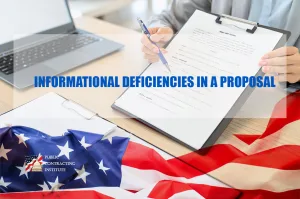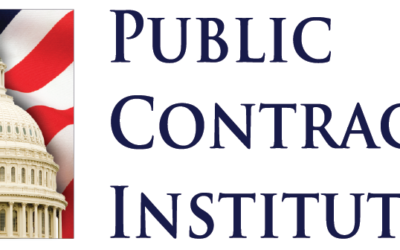INFORMATIONAL DEFICIENCIES IN A PROPOSAL. Do you think it is proper for an agency to eliminate a proposal from consideration under the following circumstances:
- Nothing in the evaluation criteria of the Request for Proposals (“RFP”) stated that proposals would be eliminated because they contained “informational deficiencies” (i.e., the proposal did not comply strictly with the solicitation’s proposal preparation instructions). The agency intended to evaluate proposals taking into consideration technical (most important), past performance, cost/price, and small business participation (least important).
- The agency asserted that it was confused as to the identity of the offeror because it could not locate the firm’s representations and Certifications in the System for Award Management (“SAM”) database. However, the offeror’s profile was located in the SAM database by the use of its contractor and government entity (“CAGE”) code, and the representations and certifications in SAM were complete and accurate.
- The agency asserted that it found the proposal unacceptable because the offeror failed to include attachment 5 (preaward survey of contractor’s accounting system checklist) of the RFP with its proposal. The RFP stated that if the offeror did not have an approved accounting system, the offeror “shall email the contracting officer to initiate an accounting system review”—something that the offeror did in a timely manner.
- The agency found that the offeror submitted its cost/price proposal in portable document file (pdf) format, rather than as a Microsoft Excel spreadsheet, as required by the RFP. The agency never gave the offeror an opportunity to resubmit in Microsoft Excel.

These were the facts in McCann-Erickson USA Inc., B-414787, Sept. 18, 2017. The bid protest involved an Army RFP for advertising services.
The Government Accountability Office (“GAO”) sustained McCann-Erickson’s protest, concluding that the Army unreasonably eliminated the company from consideration based on alleged noncompliance with the solicitation’s proposal instructions, rather than based on substantive findings made after a meaningful review of the firm’s proposal, and considering only the evaluation factors in the RFP. GAO also noted that the findings of noncompliance were based either in incorrect information, a misunderstanding of the firm’s proposal, or conclusions regarding the necessity of certain information or the agency’s ability to obtain that information through clarifications. There was nothing in the RFP evaluation criteria that told offerors that the Army would perform a preliminary compliance review to determine whether firms had complied strictly with the RFP proposal preparation instructions. Instead, the RFP evaluation criteria advised offerors that the agency would perform a meaningful substantive review.
Here is GAO’s analysis of the alleged “deficiencies” found by the Army that disqualified McCann Erickson’s offer:
- The agency asserted that it was confused as to the identity of the offeror because it could not locate the firm’s representations and Certifications in the System for Award Management (“SAM”) database. However, the offeror’s profile was located in the SAM database by the use of its contractor and government entity (“CAGE”) code which was in its proposal, and the representations and certifications in SAM were complete and accurate.
- GAO FOUND THE REQUIRED REPRESENTATIONS AND CERTIFICATIONS IN SAM, AND CALLED THIS AN “UNEXPLAINED ERROR” ON THE PART OF THE ARMY.
- The agency asserted that it found the proposal unacceptable because the offeror failed to include in its proposal attachment 5 of the RFP, which was a checklist of the preaward survey of the contractor’s accounting system. The RFP stated that if the offeror did not have an approved accounting system (and McCann Erickson did not have an approved accounting system), the offeror “shall email the contracting officer to initiate an accounting system review”—something that the offeror did in a timely manner.
- GAO FOUND THAT THE OFFEROR HAD GOOD REASON NOT TO SUBMIT ATTACHMENT 5, AND HAD COMPLIED WITH THE SPECIFIC ALTERNATIVE INSTRUCTIONS IN THE RFP FOR A COMPANY THAT DID NOT HAVE AN APPROVED ACCOUNTING SYSTEM.
- The agency found that the offeror submitted its cost/price proposal in portable document file (pdf) format, rather than as a Microsoft Excel spreadsheet. The agency never gave the offeror an opportunity to resubmit in Microsoft Excel.
- GAO FOUND THAT EITHER THE AGENCY COULD HAVE EVALUATED THE PRICE USING THE PDF SPREADSHEET, OR COULD HAVE REQUESTED A “CLARIFICATION” WHEREBY THE OFFEROR SUBSTITUTED A MICROSOFT EXCEL SPREADSHEET FOR THE PDF, WITHOUT MAKING ANY CHANGES. NO DISCUSSIONS WERE REQUIRED TO MAKE THIS CLARIFICATION.
Takeaway: This is an unusual case where GAO reasonably found that even though an offeror did not completely meet all the RFP submission requirements, the agency had unreasonably eliminated that offeror from competition. The GAO decision, as shown above, indicates that the Army was unreasonable, and disqualified McCann Erickson for reasons never set forth in the RFP. Had the Army stated in the RFP that it would have performed a “first step” compliance review to ensure proposals submitted all of the information required by the RFP, it might have been able to disqualify McCann Erickson. However, that type of compliance review could not contain errors (like the allegedly missing representations and certifications), could not ignore specific RFP direction (like the preaward survey checklist), and could not disqualify someone for a format issue (submitting pdf instead of Excel), where a simple clarification could have corrected the proposal.
For other helpful suggestions on government contracting, visit: Richard D. Lieberman’s FAR Consulting at https://www.richarddlieberman.com/, and Mistakes in Government Contracting at https://richarddlieberman.wixsite.com/mistakes.


